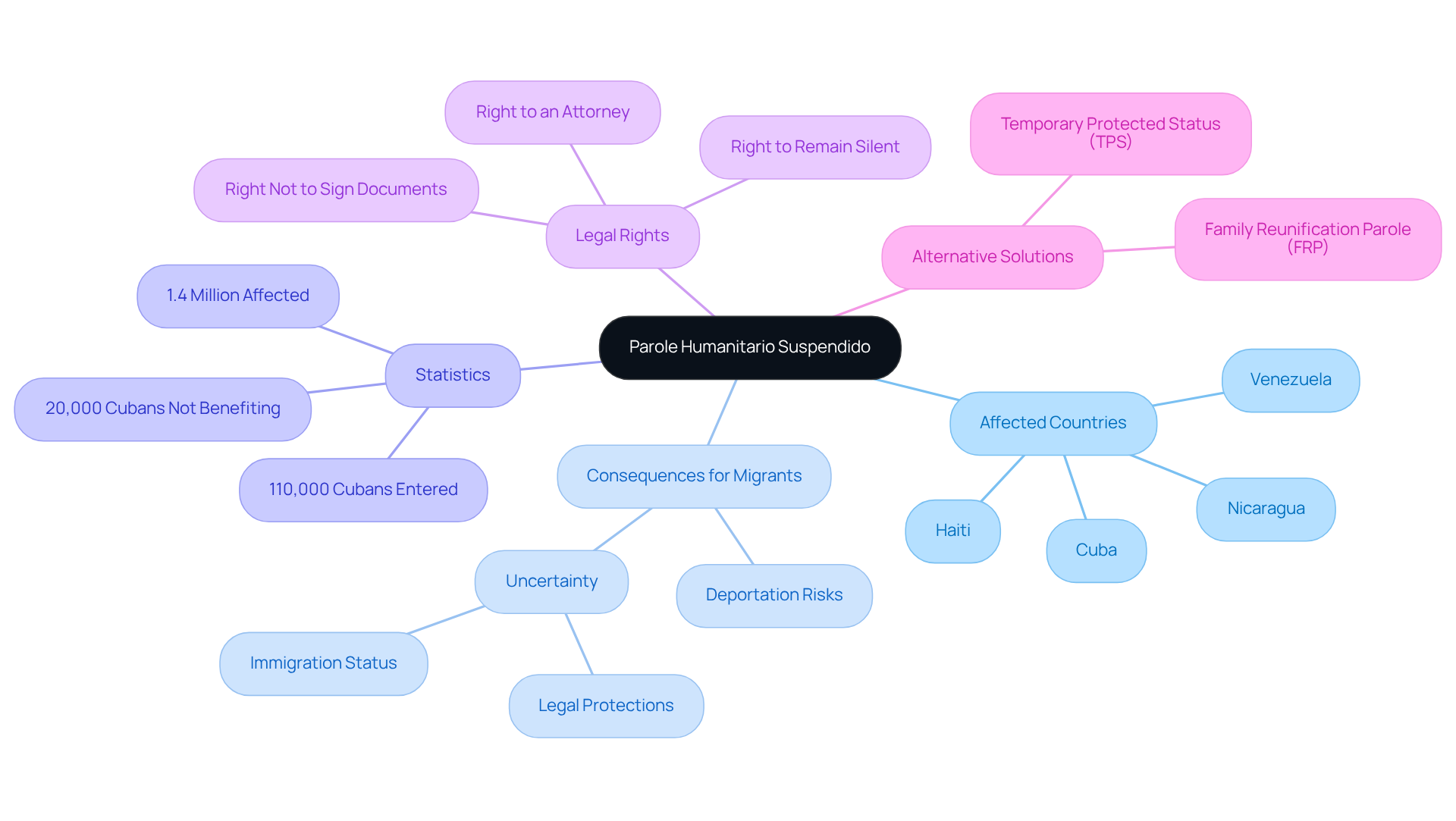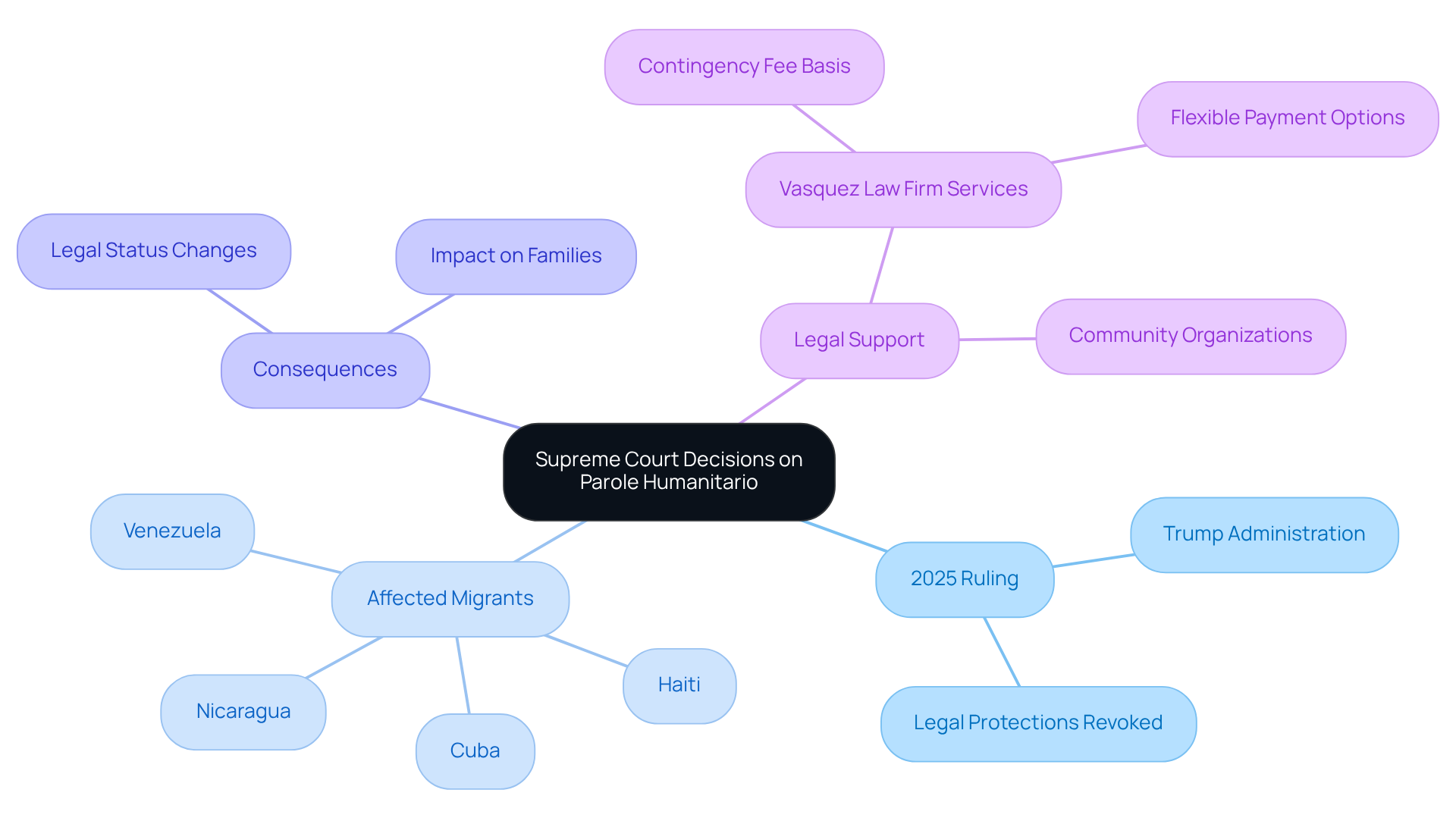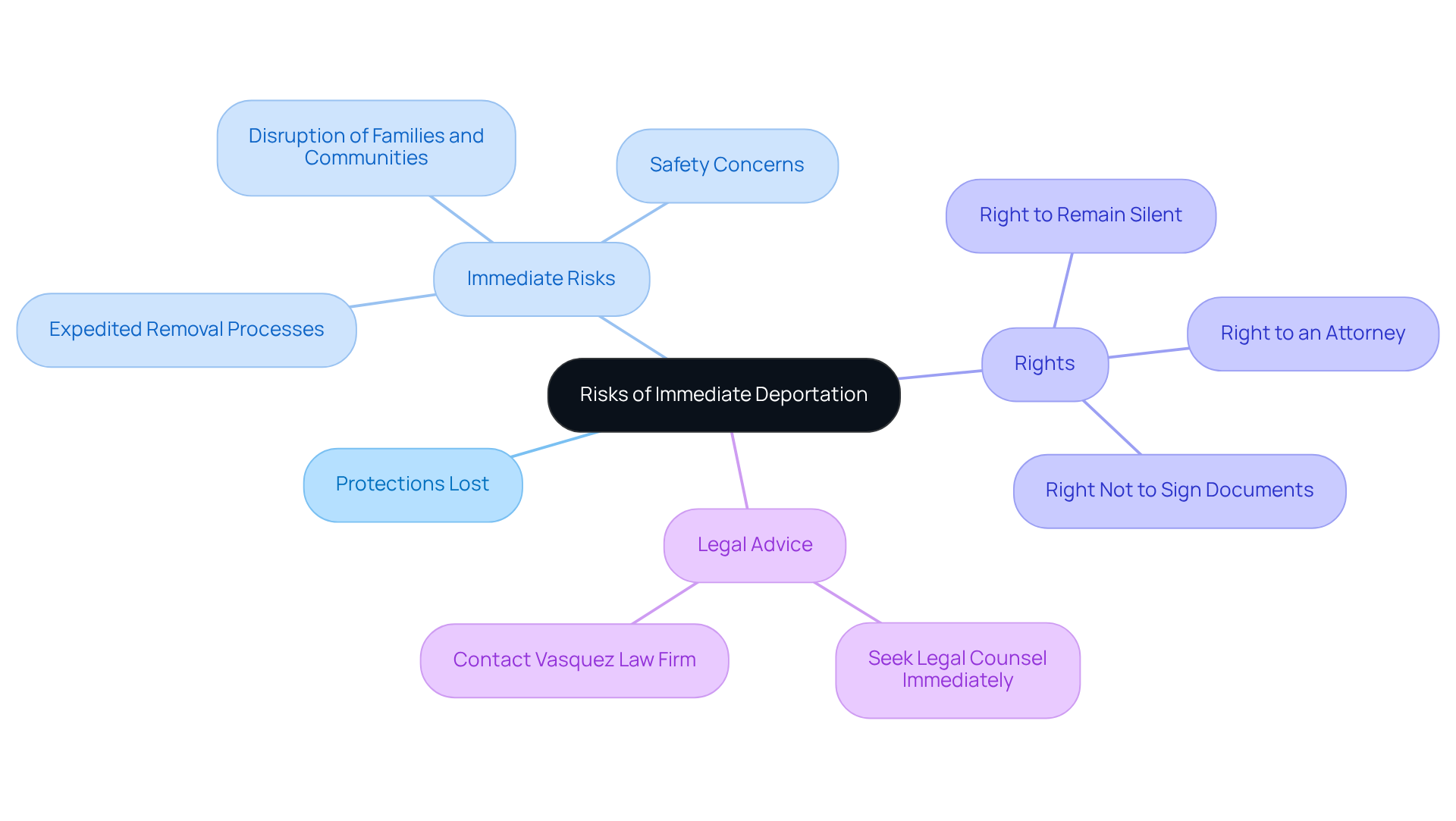Overview
The article sheds light on the pressing issue of "parole humanitario suspendido," which means the suspension of humanitarian parole for migrants from Cuba, Haiti, Nicaragua, and Venezuela. This situation puts over 1.4 million migrants at risk of deportation and leaves them in a state of uncertainty regarding their immigration status.
Have you ever felt lost in the immigration process? Many individuals now find themselves without protections, facing complex immigration hurdles. It’s crucial to recognize the urgent need for alternative solutions, such as:
- Temporary Protected Status
- Family reunification pathways
We understand how overwhelming this feels. The system can be confusing, but you don’t have to navigate it alone. We’re here to fight for your family and ensure you have the support you need. Your future matters to us, and together, we can explore the options available to you.
Introduction
The suspension of humanitarian parole for migrants from Cuba, Haiti, Nicaragua, and Venezuela represents a pivotal moment in U.S. immigration policy. Over 1.4 million individuals now face heightened risks of deportation. This sudden shift not only threatens their safety but also leaves many grappling with a maze of legal uncertainties, stripped of the protections they once depended on.
Have you ever felt lost in the immigration process? As the implications of this suspension unfold, a pressing question arises: what alternatives exist for those caught in this precarious situation? How can they secure their future amid such daunting challenges? We understand how overwhelming this feels, and it’s crucial to know that you’re not alone in this fight.
Define Parole Humanitario Suspendido and Its Implications
The term parole humanitario suspendido refers to the suspension of humanitarian parole for individuals from Cuba, Haiti, Nicaragua, and Venezuela. This status previously allowed temporary entry into the U.S. for urgent humanitarian reasons. Now, this halt has serious consequences, affecting over 1.4 million migrants who face heightened risks of deportation and unclear paths to lawful residency.
Consider this: more than 110,000 Cubans entered the U.S. through the CHNV program, yet around 20,000 are unable to benefit from the Cuban Adjustment Act because they don’t meet the one-year residency requirement. This uncertainty about their immigration status puts them in a precarious position, navigating a complex regulatory landscape with limited options.
Many migrants, particularly Cubans and Haitians, are left anxious, fearing rapid deportation and the loss of protections. As Justice Ketanji Brown Jackson highlighted, this ruling significantly impacts half a million migrants while their claims remain unresolved. Understanding the implications of parole humanitario suspendido is crucial for those affected, as it underscores the urgent need for alternative solutions, like the Family Reunification Parole (FRP) program, which can provide a pathway to secure their status in the U.S.
If you need immediate assistance, reach out to Vasquez Law Firm 24/7 for urgent matters. Remember, if you receive a subpoena or face enforcement actions, you have rights:
- the right to remain silent
- the right to an attorney
- the right not to sign documents without legal counsel
DO NOT open your door unless ICE has a warrant signed by a judge.

Examine Supreme Court Decisions on Parole Humanitario
Recent Supreme Court decisions have dramatically reshaped the landscape of parole humanitario suspendido. The 2025 ruling allowed the Trump administration to end the humanitarian parole, resulting in what is now referred to as parole humanitario suspendido for migrants from Cuba, Haiti, Nicaragua, and Venezuela. This effectively revokes the protections provided by parole humanitario suspendido that many relied on for lawful entry into the United States.
This ruling not only alters the status of these migrants but also sets a troubling precedent for future immigration policies. The consequences are far-reaching, highlighting the urgent need for those affected to understand their situation and explore available alternatives.
At Vasquez Law Firm, we recognize the real struggles you face. Navigating confusing immigration processes can feel overwhelming. But you don’t have to face it alone—we’re here to guide you every step of the way. We’re dedicated to ensuring that financial limitations don’t prevent you from pursuing justice.
We operate on a contingency fee basis for personal injury cases, meaning you pay nothing unless we win. For other practice areas, we offer flexible payment options tailored to your financial circumstances. Everyone deserves access to quality representation.
Your future matters to us. We’re here to fight for your family. Yo Peleo — We Fight.

Assess Risks of Immediate Deportation for Affected Immigrants
The parole humanitario suspendido brings serious risks of immediate deportation for many immigrants. Without the protections that parole humanitario suspendido once offered, individuals may face expedited removal processes. This is especially alarming for those who have built lives in the U.S., as they could be sent back to countries grappling with humanitarian crises. The threat of deportation not only endangers their safety but also disrupts families and communities.
It’s crucial for those affected to seek legal advice right away. Understanding your options and the potential consequences of your immigration status can make all the difference. Remember, you have rights:
- the right to remain silent
- the right to an attorney
- the right not to sign documents without professional guidance
Don’t hesitate to reach out to Vasquez Law Firm at 1-844-967-3536 for urgent assistance. Our team is here for you 24/7, ready to fight for your rights and support you through this challenging time. Your future matters to us—Yo Peleo — We Fight.

Explore Alternative Immigration Options for Affected Individuals
If you’re feeling the impact of the parole humanitario suspendido, know that there are alternative residency options available to you. Have you considered seeking Temporary Protected Status (TPS)? This can provide crucial protection for individuals from countries facing ongoing conflict or natural disasters. You might also explore family-oriented pathways, like petitions from U.S. citizen relatives. And if you’re facing persecution in your home country, applying for asylum could be a viable option. Additionally, there are special visas designed for victims of crime or trafficking that you may qualify for.
It’s vital to connect with an immigration attorney at Vasquez Law Firm. They’re dedicated to offering tailored representation and can help evaluate your eligibility for these options. We understand how overwhelming this feels, but you don’t have to navigate this alone. With 24/7 support and a focus on client care, Vasquez Law Firm is here to assist you in effectively managing the complex application processes.
Plus, the firm offers free consultations, ensuring you can access the legal support you need without financial barriers. Your future matters to us, and we’re ready to fight for your family.
Conclusion
The suspension of humanitarian parole, or parole humanitario suspendido, creates serious challenges for migrants from Cuba, Haiti, Nicaragua, and Venezuela. This situation puts over 1.4 million individuals at heightened risk of deportation and leaves them with uncertain paths to lawful residency. It’s crucial for these migrants to understand their legal standing and explore alternative solutions to secure their future in the United States.
Recent Supreme Court rulings have reshaped immigration policies, stripping away protections that many relied upon. The looming threat of immediate deportation disrupts lives and families, while limited options for legal recourse complicate the search for stability. It’s essential to highlight alternative immigration pathways, like Temporary Protected Status and asylum, which underscore the need for individuals to seek professional legal guidance.
In light of these pressing issues, affected individuals must take proactive steps to secure their rights and explore available immigration alternatives. Connecting with experienced legal counsel, such as the dedicated team at Vasquez Law Firm, can provide vital support during this challenging time. The fight for justice and a safe future is paramount, and understanding one’s rights and options is the first step toward reclaiming agency in the face of adversity.
Remember, you’re not alone in this fight. We’re here to support you every step of the way. Your future matters to us. Yo Peleo — We Fight.
Frequently Asked Questions
What does "parole humanitario suspendido" mean?
"Parole humanitario suspendido" refers to the suspension of humanitarian parole for individuals from Cuba, Haiti, Nicaragua, and Venezuela, which previously allowed temporary entry into the U.S. for urgent humanitarian reasons.
Who is affected by the suspension of humanitarian parole?
The suspension affects over 1.4 million migrants from Cuba, Haiti, Nicaragua, and Venezuela, increasing their risks of deportation and complicating their paths to lawful residency.
What are the specific consequences for Cuban migrants under this suspension?
More than 110,000 Cubans entered the U.S. through the CHNV program, but around 20,000 are unable to benefit from the Cuban Adjustment Act due to not meeting the one-year residency requirement, leaving them in a precarious immigration status.
How does the ruling impact the emotional state of migrants?
Many migrants, especially Cubans and Haitians, are left anxious and fearful of rapid deportation and losing protections, as highlighted by Justice Ketanji Brown Jackson, who noted that half a million migrants are affected while their claims remain unresolved.
What alternative solutions are available for affected migrants?
Understanding the implications of "parole humanitario suspendido" emphasizes the urgent need for alternative solutions, such as the Family Reunification Parole (FRP) program, which can provide a pathway to secure their status in the U.S.
What rights do individuals have if they face enforcement actions?
Individuals have the right to remain silent, the right to an attorney, and the right not to sign documents without legal counsel. It is also advised not to open the door unless ICE has a warrant signed by a judge.
Where can individuals seek immediate assistance regarding their immigration status?
Individuals can reach out to the Vasquez Law Firm 24/7 for urgent matters related to their immigration status.




